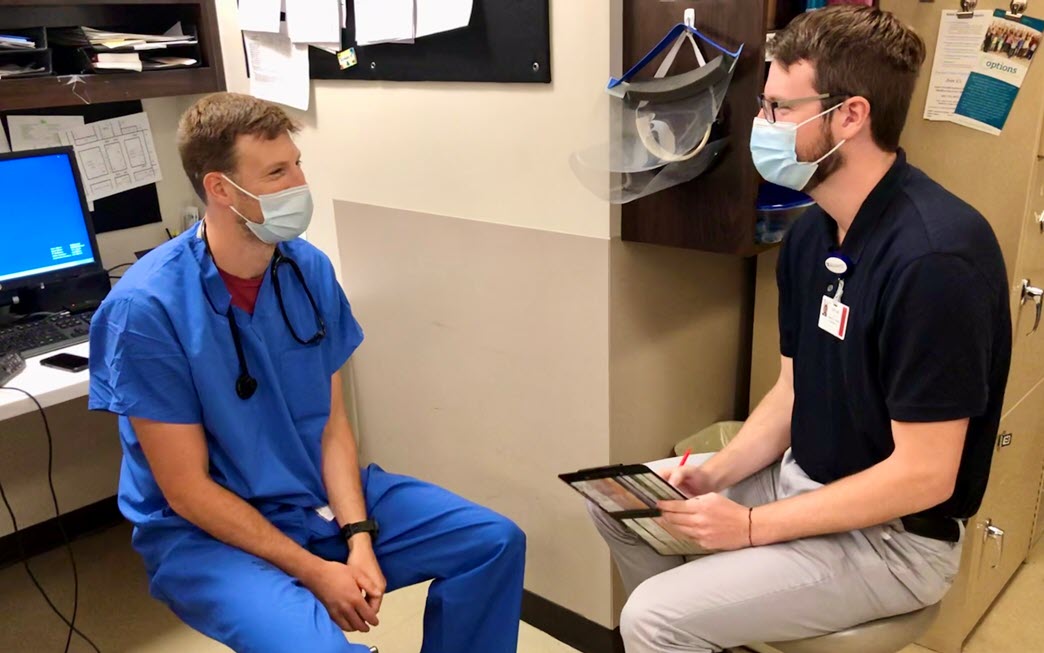Share:
The heart of caring for patients on opioids
“…When there are many of these flowers together their odor is so powerful that anyone who breathes it falls asleep, and if the sleeper is not carried away from the scent of the flowers, he sleeps on and on forever.” — “The Wonderful Wizard of Oz,” 1900
The beauty and peril of opium are laced in its original floral name, Papaver somniferum, meaning “sleep bringing.” Since the start of the pandemic, Oregon has reported a nearly 40% hike in annual overdose deaths, similar to national trends.
To safeguard our community from opioid misuse and abuse, Kevin Kelleher, MD, an ARRMC emergency physician, advocates for opioid stewardship.

“I frequently treat patients addicted to narcotics and see first-hand how this addiction negatively impacts every aspect of a person’s life,” he says. “It is important for medical professionals to use opioids only when necessary, make sure that we are being careful with the doses given and always consider alternatives to pain management.”
His conviction for best-practice inpatient use of opioids is shared by ARRMC hospitalist Daniel Oreskovich, MD, who serves as a co-champion with Dr. Kelleher in opioid stewardship.
“The recent growing epidemic of opioid overuse and abuse has significantly impacted Southern Oregon,” he says. “To make a cultural change, we have to start with education and awareness for medical professionals and implementation of new policies and guidelines.”
In response to the opioid overdose epidemic, Pharmacy and Nursing have partnered with Drs. Kelleher and Oreskovich to develop a leaner policy on opioid management aligned with national guidelines.
Boone Richardson, Asante Medication Safety Council nurse co-chair, empowers nurses as key stakeholders in helping patients aim for achievable pain goals through pharmacologic and non-pharmacologic means.
“Nurses in acute care settings are intimately familiar with walking the fine line between reducing undue pain and avoiding opioid-related adverse effects,” he says. “The updated policy guides nurses to proactively communicate with providers to adjust opioid doses, shift from IV to PO options, and discontinue opioids when possible.”

Rani Scranton, medication safety coordinator and AMASC co-chair, unveils the heart of the policy for improving opioid care and safety.
“Safe administration of opioids is a delicate balance between providing pain relief at the lowest effective dose and monitoring opioids to ensure pain is controlled and risk of over-sedation minimized,” she says. “When multiple agents are ordered, health care teams should understand the timing of opioid peak effectiveness so that stacking of opioid orders and administrations can be more thoughtfully planned for maximum benefit. Nursing can also work with providers and Pharmacy to help patients transition to realistic tapering opioid regimens on discharge.”
The new policy centers on managing acute pain in opioid naïve, perioperative and opioid-experienced patients, replacing two former policies with overlapping content. Highlights include:
- A new dose and dose reduction section.
- The monitoring and sedation section clarifies who is at increased risk for respiratory depression, when to assess and document on the Pasero Opioid-Induced Sedation Scale, and how to monitor continuous respiratory rate or end tidal CO2 for opioid patients.
- Nursing interventions to taper opioid use for postsurgical patients.
- Guidance for nurses to work with patients and providers to discontinue unnecessary opioids.
- Other sections help direct the selection of opioid routes, effective duration, premedication for anticipated pain, adjuvant therapies, patient and family education, and management of opioid complications.
References:
- Centers for Disease Control and Prevention, “Understanding the Epidemic.”
- Oregon Health Authority, “Oregon trends with U.S. in accelerated drug overdoses.”
If you have a question, please contact the author or relevant department directly.



